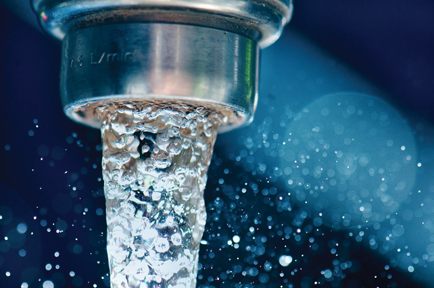Due to critically dry hydrologic conditions, the U.S. Bureau of Reclamation (USBR) is updating water supply allocations for Central Valley Project (CVP) municipal and industrial water service contractors.
Effective April 1, water supply for all Central Valley Project Municipal & Industrial (M&I) water service contractors is reduced to Public Health and Safety only. The announcement comes after the first three months of 2022 are the driest in the state’s recorded history.
Initial CVP water supply allocations were announced last month. These included a 25% allocation for M&I water service contactors with exception of north-of-Delta M&I contractors, who were already allocated Public Health and Safety due to limited northern California water storage.
San Benito County Water District (SBCWD) is a federal contractor with the USBR and imports water from the CVP. Our county’s share of this water is stored in San Luis Reservoir before being pumped through the Pacheco Pass to our county. The imported surface water helps keep our local groundwater basin stay in balance, is used to improve our drinking water quality and assists in producing high-quality, specialty crops.
Winter storms brought significant snowfall to the Sierra Nevada and other California mountains in December. Snowpack is critical for the state’s spring water outlook because when the snow melts it runs downhill into streams that fill reservoirs that hold about 30% of the state’s water supply. This water is moved throughout the state via the State Water Project and the Central Valley Project (CVP).
On Dec. 30, the Sierra snowpack was estimated to be about 160% of the historical average for that date. Since the start of the year, snowpack has melted precipitously. On April 4, the snowpack measured 33% of the historical average for this date.
Local water agencies implemented Stage 1 Water Conservation Measures in May 2021 after Governor Newsom expanded his April drought emergency proclamation. In total, 41 counties were under a drought state of emergency, representing 30% of the state’s population. The expanded drought emergency proclamation added San Benito County. The water conservation measures that were implemented called for a voluntary 15% reduction in water use compared to pre-drought usage.
In October 2021 Governor Newsom declared a drought emergency for the entire state of California.
With this latest news from the USBR, water managers in Hollister and San Juan Bautista are bringing resolutions to their boards and councils to implement Stage II of the Water Shortage Contingency Plan. This stage calls for mandatory water conservation with the goal of reducing water use 25% of pre-drought levels.
Our groundwater basin acts as a back-up water supply. We must stretch this supply as much as we can since we don’t know when the drought will end.
The Stage II water conservation measures will take effect sometime in May. Since we are entering our peak irrigation season most of the measures will focus on outside water use. These measures shall include, but are not limited to:
– Landscape watering will be limited and restricted to no more than two days per week.
– No watering of landscapes between the hours of 9am and 5pm by means other than drip irrigation or hand watering with a shutoff nozzle.
– No washing down sidewalks, driveways or other hardscape surfaces.
– No watering landscapes in a manner that causes runoff to adjacent property, non-irrigated areas, private and public walkways, roadways or parking lots.
– No washing of cars without the use of a shutoff nozzle.
– No operation of decorative fountains or other water features unless the water is recirculated.
General requirements:
– Leaks, breaks and malfunctions of irrigation systems and plumbing equipment causing water waste of water shall be repaired and corrected within a reasonable amount of time.
Prohibitions affecting commercial businesses:
– Restaurants and other food service establishments can only serve water on request
– Operators of hotels and motels must provide guests with the option of choosing not to have towels and linens laundered daily and prominently display notice of this option.
Code Enforcement will be patrolling looking for violators of these measures.
Penalties for violating the outdoor water restrictions shall be:
– First Violation: written notice with opportunity to correct violation
– Second Violation: $100 penalty for violation within 12 months of First Violation
– Third Violation: $250 penalty for a violation within 12 months of Second Violation
– Fourth Violation: $500 penalty and installation of a flow restrictor at the water meter at the customer’s expense for every violation within 12 months of a Third Violation
The Water Resources Association San Benito County offers free services to assist customers in complying with these measures. Free irrigation assistance, free hose nozzles and free signage for hotels. Call them for a free leak check and irrigation assessment. They can be reached at 831.637.4378. For more water saving ideas, visit: www.wrasbc.org.
Shawn O. Novack is the Water Conservation Program Manager for the Water Resources Association of San Benito County, San Benito County Water District.








